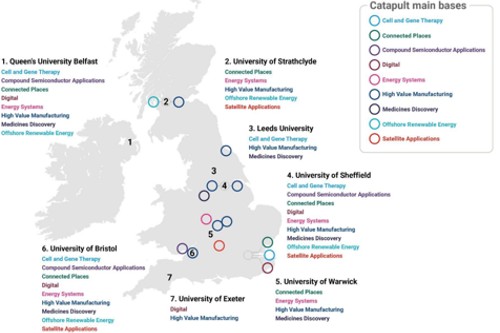
The network is a national collaboration, led by the University of Sheffield with the Universities of Leeds, Strathclyde, Warwick, Bristol and Exeter, and the Catapult Network.
The University of Bristol is part of a new £6.75 million national network to accelerate UK innovation. The Innovation Launchpad Network+ will bring together leading universities, the Catapult Network and regional innovation ecosystems to enrich the exchange of ideas and knowledge across these organisations.
The network is a national collaboration, led by the University of Sheffield with the Universities of Leeds, Strathclyde, Warwick, Bristol and Exeter, and the Catapult Network. There are currently nine Catapults, each established by and working in partnership with Innovate UK. They support businesses across healthcare, energy, emerging technologies and manufacturing in transforming great ideas into valuable products and services.
To foster new links between individuals or groups and the Catapult Network, the programme will deliver 100 world-class Researchers in Residence programmes and will focus on the themes of net zero, healthcare and wellbeing, and resilience.
The programme builds on the successful Catapult Fellows and Researcher in Residence programmes and aims to create a truly inclusive and integrated science-innovation community.
Professor Ben Hicks from the University of Bristol is a co-investigator on the grant and responsible for Research Quality. He said: "This is a timely initiative for the region and will be a key component in accelerating the translation of cutting-edge research from the region's HEIs. It will also facilitate greater connections and long-term partnerships between our regional innovation ecosystems (including our world leading incubators), the Catapults and other HEIs nationally."
Matthew Durdy, Chair of the Catapult Network and CEO of Cell and Gene Therapy Catapult says: "We welcome this important initiative which strikes right at the heart of our aim to build a collaborative research, development and innovation landscape. Catapults and academia working together will provide first-class knowledge exchange and a launchpad to bring researchers closer to innovation in industry, giving them valuable exposure to the translation and commercialisation of research."
The programme will support two complementary pathways for research residencies, both of which aim to place the right researcher in the right Catapult at the right time. The first pathway will support residencies that contribute directly to delivery of the Catapults' strategic roadmaps, which are near-term industry needs.
The second aims to leverage the capability of the Catapults to accelerate the translation of science in partnership with higher education institutions (HEIs) and regional innovation ecosystems, which can include other non-Catapult research and technology organisations (RTOs) and incubators.
Benoit Welch, an Innovation specialist within the University of Bristol's Research and Development unit, added: "This newly funded scheme will perfectly complement our existing mechanisms for funding innovation projects and knowledge exchange (e.g., Impact Acceleration Accounts and Knowledge Transfer Partnerships), allowing a more integrated pipeline for translation of research."
Applications for the Researcher in Residence scheme will open in October. Additional funding for travel and feasibility studies will also be available to support the co-creation of research residencies. The Innovation Launchpad Network+ includes previously successful academics, who will offer their support and mentoring to new applicants.
An online event is being held from 12pm-2pm on Thursday 6 October 2022, where researchers can find out more about the Innovation Launchpad Network+ and the opportunities provided by the Researcher in Residence scheme. To register for a ticket, visit: https://www.eventbrite.co.uk/e/innovation-launchpad-network-launch-event-tickets-399470205137






